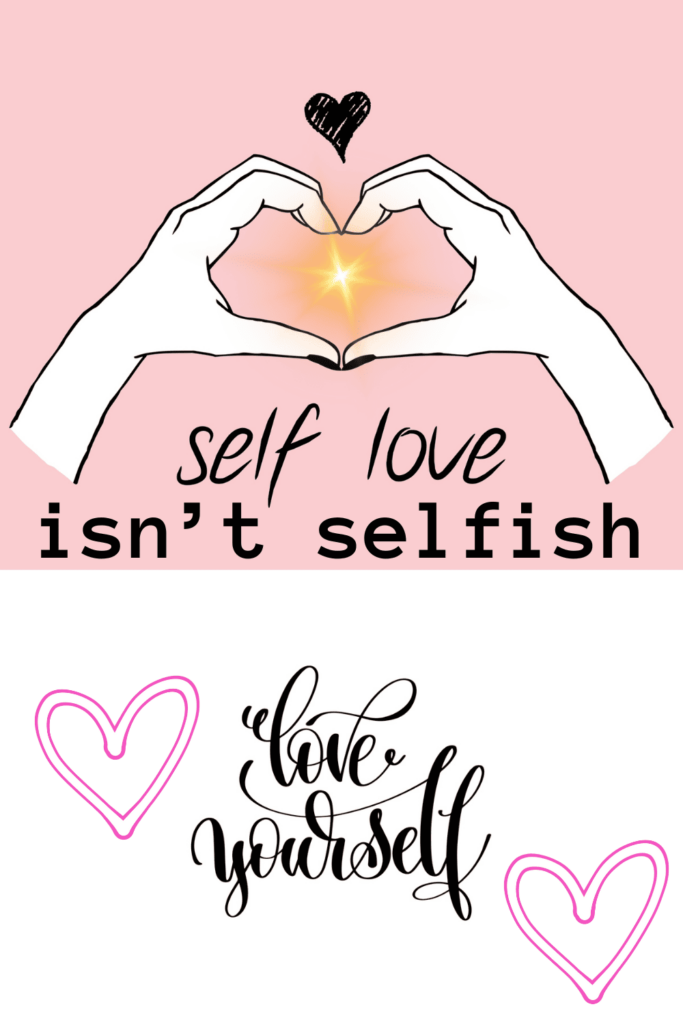
Self-Love is Not Selfish means recognizing and honoring your own needs and boundaries while also respecting and considering the needs and boundaries of others. It is about finding a balance between self-care and compassion for others, leading to a healthy, fulfilling life and meaningful connections.
| Key Points | Summary |
|---|---|
| Definition | Self-love is recognizing and honoring your own needs and boundaries while also respecting and considering the needs and boundaries of others. |
| Importance | Self-love is crucial for mental health, resilience, self-care, emotional balance, healthy relationships, and overall well-being. |
| Misconceptions | Self-love is often mischaracterized as selfishness, but they are significantly different. Self-love involves a balance between self-care and compassion for others, while selfishness disregards others’ needs and focuses solely on personal gain. |
| Challenges | Common challenges in practicing self-love include societal expectations, negative self-talk, past trauma, fear of being selfish, and lack of role models. |
| Recommendations | Recommendations for cultivating self-love include practicing self-compassion, challenging negative self-talk, fostering supportive relationships, making self-care a priority, setting healthy boundaries, and being patient with oneself. |
For a long time, I equated self-love with selfishness.
I believed that prioritizing myself meant neglecting others and being self-centered.
However, over time, I have come to realize that real self-love is far from selfishness.
It is, in fact, an essential component of being mentally healthy and satisfied with life.
Self-love is often seen as just selfishness. But real self-love is different.
Real self-love means caring for yourself in a balanced way. It is an important part of being mentally healthy and satisfied with life.
Selfishness is when you only care about yourself and ignore others’ needs.
With real self-love, you care for your own needs while still being kind to others.
You don’t have to give up your needs for others. But you also don’t ignore their needs either.
Real self-love lets you accept yourself as a flawed but worthy human being. It gives you strength to handle life’s challenges in your own way.
Selfishness makes you cold to others’ problems. But with self-love, you have energy left over to show compassion.
True self-love walks a middle road. It means you don’t sacrifice your fulfillment to please everyone.
But you also don’t step on others in a greedy grab at life. Self-love leads to self-respect and caring connections.
So self-love is not the same as just pleasing yourself. It balances your needs with those of others.
This builds a satisfying life and thoughtful community.

Benefits of Self-Love
When you make self-love a priority, you experience several positive outcomes.
Increased motivation and self-efficacy
By caring for your needs, desires, and values, you build an inner foundation of confidence. This gives you the drive to pursue personal growth and life goals with passion. Self-love boosts belief in your abilities so you can achieve your full potential. For example, when I started practicing self-love, I found that I was more motivated to work towards my goals and felt more confident in my abilities to achieve them.
Enhanced resilience and coping skills
Self-love involves treating yourself with kindness and patience during difficult times. This builds emotional reserves to roll with life's hardships. Setbacks hurt less when you respond to yourself with compassion rather than criticism. Self-love provides inner strength and perspective to navigate challenges. It is worth noting that self-compassion, a key component of self-love, has been associated with greater resilience and lower levels of stress and depression
Deeper self-respect and self-care
With self-love, you make choices that support your overall wellbeing - from eating nutritiously to exercising to getting sufficient sleep. You don't abuse your body or sacrifice your needs. You honor your whole self - body, mind, and spirit. This self-respect enables you to care for your health and uphold your boundaries. Personally, practicing self-love has helped me make healthier choices and prioritize self-care in my daily routine.
Greater emotional intelligence and balance
When you understand your needs through self-love, you can communicate them tactfully. Neither bottling up emotions nor expressing them explosively brings happiness. Self-love allows authentic self-expression and thoughtful connection with others. You can acknowledge your feelings while also considering others' perspectives. This has been particularly important in my relationships, as it has helped me express my needs and feelings more openly and constructively.
Cultivating Self-Love
Self-love takes mindful, ongoing cultivation. Here are some recommendations.
Practice self-compassion
Notice any harsh inner voices criticizing you and talk to yourself with kindness and understanding instead.
We all make mistakes – be gently forgiving rather than beating yourself up.
Offer yourself the grace and care you would a close friend. Talk to yourself like you would to someone you love.
For example, when I make a mistake, I try to remind myself that it’s a part of being human and use it as an opportunity to learn and grow.
Identify and reframe negative self-talk
Pay attention to the ways you think about and judge yourself.
Challenge inner voices that reinforce low self-worth.
Purposefully replace harsh self-criticism with more encouraging truths about your inherent value.
I used to be my own worst critic, but I have learned to catch myself when I start engaging in negative self-talk and consciously choose to replace it with positive affirmations.
Foster supportive, uplifting relationships
Surround yourself with people who appreciate, validate, and accept the real you.
Limit time spent with those who undermine your self-esteem through criticism, judgment, or passive aggression.
Good relationships boost self-love.
I have found that surrounding myself with positive and supportive people has made a significant difference in my journey towards self-love.
Make self-care a daily priority
Do activities that nurture your body, mind, and spirit – healthy eating, exercising, getting adequate sleep, spending time in nature, making art, engaging your spirituality, or anything that fills your cup.
Don’t run yourself into the ground.
For me, spending time in nature and practicing mindfulness have been essential self-care activities.

Set healthy boundaries
Know your limits and honor them.
Practice saying “no” without guilt or excuses when you need to protect your time and energy.
With self-love, you don’t say yes at your own expense.
Learning to set healthy boundaries has been a crucial part of my self-love journey.
Be patient with yourself
Understand that self-love develops over time.
Celebrate each small act of self-care or positive thought shift.
Gradually your inner critic transforms into a compassionate supporter.
Patience has been key for me, as self-love is a journey, not a destination.

Challenges in Practicing Self-Love
Practicing self-love can be particularly challenging due to several reasons.
- Societal Expectations: Our society often values self-sacrifice and putting others’ needs before our own. This can make it difficult to prioritize self-love without feeling guilty or selfish.
- Negative Self-Talk: Many of us have a harsh inner critic that constantly judges and criticizes us, making it difficult to develop a loving and compassionate relationship with ourselves.
- Past Trauma: Experiences of trauma or abuse can lead to feelings of unworthiness and self-blame, making it difficult to practice self-love.
- Fear of Being Selfish: As mentioned earlier, there is a common misconception that self-love is the same as selfishness, which can make people hesitant to prioritize their own needs and well-being.
- Lack of Role Models: Many people did not have role models growing up who modeled healthy self-love and self-care, so they may not have learned how to practice self-love in a healthy way.
Overcoming these challenges requires conscious effort and practice.
It involves challenging societal norms, confronting and healing past traumas, and actively working to change negative thought patterns.
It also involves seeking out positive role models and learning healthy ways to practice self-love and self-care.
Remember, it is okay to seek help if you are struggling with self-love. Therapy, support groups, and self-help books can be valuable resources on your journey towards self-love.

Self-Love is Not Selfishness
Self-love is frequently mischaracterized as selfishness, but they differ significantly.
Selfishness disregards others' needs and focuses solely on personal gain. Self-love thoughtfully balances caring for your own needs with considering others' needs too. For example, practicing self-love might involve taking time for self-care even when others demand your attention, but it also means being there for others when they need you.
Selfish people have a sense of entitlement and demand that their needs always come first. With self-love, you honor your own boundaries and needs without dismissing, exploiting, or harming others. This aligns with the principles of social cognitive theory, which emphasizes the importance of observing and learning from the consequences of one's actions on others.
Selfishness often comes from a scarcity mindset and fear - the irrational belief that there is not enough for everyone so you must aggressively grab as much as possible for yourself. Self-love recognizes your own worth and needs AND believes in the inherent worth and needs of others too - there is enough for all to thrive. This belief in your own abilities and the abilities of others is a key component of self-efficacy, which is crucial for achieving your goals.
Those lacking in self-love are often so drained that they have nothing left to give to others - leading to burnout and empathic erosion. With self-love, your own self-care and fulfillment fuels your capacity to be present and compassionate. For example, taking time for self-care can actually make you more present and attentive in your interactions with others.
Selfish people struggle to sustain healthy relationships because they use people transactionally. Self-love allows genuinely caring connections. Practicing self-love can lead to more fulfilling and meaningful relationships because it involves treating others with the same kindness and respect that you treat yourself.
So self-love creates no victims. It simply recognizes your humanity while also honoring the humanity in others. When you care for yourself wisely, you have reserves to be your best self for yourself and others.
Final Words
Self-love is not the same as just pleasing yourself. It balances your needs with those of others.
This builds a satisfying life and thoughtful community. It is about recognizing and honoring your own needs and boundaries while also respecting and considering the needs and boundaries of others.
For example, practicing self-love might involve taking time for yourself each day to meditate, exercise, or engage in a hobby that brings you joy, even if it means saying no to social invitations or other demands on your time.
It also means being there for a friend in need, even if it means rearranging your schedule or stepping out of your comfort zone.
Ultimately, self-love is about treating yourself with the same kindness, compassion, and respect that you would offer to a loved one.
It is about recognizing your own worth and taking actions that support your well-being and growth.
Remember, self-love is not selfish. It is the foundation for a healthy, fulfilling life and meaningful connections with others.
So, start today. Make self-love a priority in your life. Your future self will thank you.

Frequently Asked Questions
How Can We Practice Self-Love Without Being Selfish?
Loving yourself does not have to be selfish when done with care and wisdom. True self-love involves balancing compassion for yourself with consideration for others.
Make self-care a priority while also being present and generous towards loved ones. Aim for interdependence rather than independence. Stay aware of not neglecting your needs or neglecting others in the name of self-love.
Self-love should empower you to contribute to the world, not isolate you from it. Reflect on whether your actions come from a place of scarcity or inherent worth.
With mindful self-love, you can uphold your well-being while also enhancing the lives of those around you.
Can Self-Love Lead to Narcissism?
Genuine self-love is about care and worthiness, not inflated ego or entitlement.
Narcissists pursue selfish gain, dominate others and crave external validation. With true self-love, you recognize your value while also remaining humble and compassionate.
Some self-focus is healthy, but narcissism takes it to dark extremes. The key is balance – be attentive to your needs while also considering others’ perspectives.
Seek growth through self-reflection, not self-glorification. Express yourself authentically without making it all about you.
Self-love should open your heart, not close it off in conceit. Keep the focus on connecting meaningfully.
How does self-love contribute to our overall well-being?
Self-love lays the foundation for overall health and life satisfaction.
When you care for your needs and honor your feelings, you reduce anxiety, depression and stress. You gain emotional resilience.
Self-love enables rejuvenating self-care and lifestyle habits. It inspires purposeful goals.
By believing in your worth, you surround yourself with uplifting people and opportunities. Self-love allows authentic self-expression and thoughtful relationships.
When you compassionately accept yourself, flaws and all, you extend that grace to others too. This builds a community where everyone can thrive.
Overall well-being begins with caring for your whole self – body, mind and spirit.
Is it normal to struggle with self-love?
Absolutely. Many people did not receive enough unconditional love early on. Self-criticism often develops as a coping mechanism. Society also sends messages that self-love is selfish.
But you can learn self-love skills no matter what your upbringing.
Be patient and celebrate small steps. Self-love is a gradual practice, not perfection. Focus on reparenting yourself with compassion. Quiet your inner critic and treat yourself as you would a dear friend.
Enlist support and resources as needed. Know that you are worthy, even if you struggle to feel it.
Have faith that caring for yourself will become more natural with time and effort.
Your worth has no exceptions.
Can self-love improve my relationships with others?
Yes, self-love lays the foundation for healthy relationships in many ways.
When you compassionately accept yourself, you are less judgmental towards others. You don’t take things personally or react defensively.
Mindful self-care gives you energy to be present for your loved ones. Loving yourself helps you set boundaries around those who disrespect or drain you.
You value yourself enough to speak up about needs and walk away from abuse.
Self-love allows genuinely caring connections, not just codependency. When you emanate self-love, you attract others with similar integrity.
You relate to the world with empathy yet wisdom. So yes, self-love profoundly improves the quality of your bonds.
Is self-love a one-time thing or a continuous process?
Ongoing process is the answer. We have to revisit and flex our self-love skills continually to keep them strong.
Daily self-care, affirmations, reflection and boundary setting reinforce self-love. It requires tuning out unhelpful messages from society, family, and our inner critic.
Self-doubt sometimes still sneaks in. But each time you re-anchor in your worthiness, self-love grows. Like any muscle, self-love needs regular exercise through effort and repetition.
Be patient on the journey. With compassionate perseverance, practicing self-love becomes easier and more natural over time. Soon self-care just becomes your lifestyle, not a chore.
You may also be interested in: 1. Self-Love Poems to Remind You About Loving Yourself More 2. Self-Love Mindset [How to Love Yourself Again] 3. Self-Care vs Self-Love. What's the Difference? 4. Loving-Kindness Meditation Script




